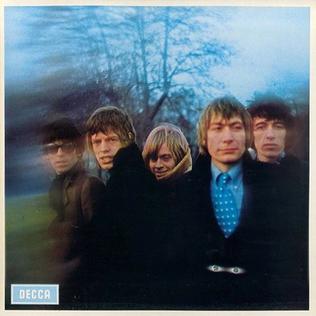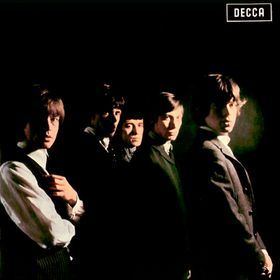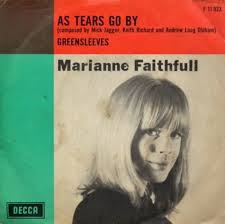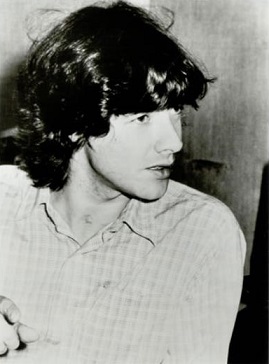
Immediate Records was a British record label, started in 1965 by The Rolling Stones' manager Andrew Loog Oldham and Tony Calder, and concentrating on the London-based blues and R&B scene.

Andrew Loog Oldham is an English record producer, talent manager, impresario and author. He was manager and producer of the Rolling Stones from 1963 to 1967, and was noted for his flamboyant style.

Small Faces is the second studio album by Small Faces, released through Immediate Records on 23 June 1967. Although this was their first album for new manager Andrew Loog Oldham's Immediate label, recording actually commenced during their tenure with Decca Records, whom they left in January 1967 after severing professional ties with original manager Don Arden. As a result of the switch of label and management, Decca and Arden released an outtakes compilation album, From the Beginning in early June 1967 in order to sabotage the chart success of the Immediate Small Faces release - something that it managed to do to some extent when From the Beginning reached number 17 in the UK charts. The Immediate album shares its name with their 1966 Decca debut album, which has led to some confusion regarding the titles. As a result of this, it has been unofficially dubbed The First Immediate Album by several fans.

Their Satanic Majesties Request is the sixth studio album by the English rock band the Rolling Stones, released in December 1967 by Decca Records in the UK and by London Records in the United States. It was the first Rolling Stones album released in identical versions in both countries. The title is a play on the "Her Britannic Majesty requests and requires" text that appeared inside a British passport.

Between the Buttons is the fifth British and seventh American studio album by the English rock band the Rolling Stones, released on 20 January 1967 in the UK and 10 February in the US. Reflecting the band's brief foray into psychedelia and baroque pop balladry during the era, the album is among their most eclectic works; multi-instrumentalist Brian Jones frequently abandoned his guitar during the sessions in favour of instruments such as organ, marimba, dulcimer, vibraphone, kazoo, and theremin. Keyboard contributions came from two session players: former Rolling Stones member Ian Stewart and frequent contributor Jack Nitzsche. Between the Buttons would be the last album produced by Andrew Loog Oldham, who had, to this point, acted as the band's manager and produced all of their albums.

December's Children (And Everybody's) is the fifth American studio album by the English rock band the Rolling Stones, released in December 1965. It is primarily compiled from different released tracks from across the band's recording career up to that point, including the UK version of Out of Our Heads. Bassist Bill Wyman quotes Jagger in 1968 calling the record "[not] an album, it's just a collection of songs." Accordingly, it is only briefly detailed in Wyman's otherwise exhaustive book Rolling with the Stones. It features their then-recent transatlantic hit single "Get Off of My Cloud", as well as their own remake of Marianne Faithfull's Jagger/Richards-penned hit "As Tears Go By", which was released as the album's second single in the US.

The Rolling Stones is the debut studio album by the English rock band the Rolling Stones, released by Decca Records in the UK on 17 April 1964. The American edition of the LP, with a slightly different track list, came out on London Records on 29 May 1964, subtitled England's Newest Hit Makers, which later became its official title.

Got Live If You Want It! is an album of mostly live recordings by the English rock band the Rolling Stones. It was released in November 1966 by London Records in the United States. With its release, the label attempted to fill a marketing gap between the Stones' studio albums and capitalise on their popularity in the U.S. market, which was heightened that year by a famously successful North American concert tour supporting their hit album Aftermath (1966).

Five by Five is the second EP by the Rolling Stones and was released in 1964. Captured during a prolific spurt of recording activity at Chess Studios in Chicago that June, Five by Five was released that August in the UK shortly after their debut album, The Rolling Stones, had appeared. The title of Five by Five is a play on words—five tracks recorded by a band with five members.

More Hot Rocks is a compilation album by the Rolling Stones released in December 1972 on London Records. The album was a follow-up to the successful Hot Rocks 1964–1971.

Singles Collection: The London Years is a compilation album by the Rolling Stones, released in 1989. It was released as a 3-CD and a 4-LP set.

"As Tears Go By" is a song written by Mick Jagger, Keith Richards and Rolling Stones' manager Andrew Loog Oldham. Marianne Faithfull recorded and released it as a single in the United Kingdom in 1964. Her song peaked at number nine on both the UK and Irish singles charts. Later, the Rolling Stones recorded their own version, which was included on the American album December's Children . London Records released it as a single, which reached number six in the Billboard Hot 100 singles chart.

Duncan John Browne was an English singer-songwriter and musician. His debut album, Give Me Take You, was released by Immediate Records in 1968. Its 1973 follow-up, Duncan Browne, spawned a minor UK hit single "Journey" and has garnered cult status among fans of 1970s folk rock. Browne formed the art rock band Metro with Peter Godwin and Sean Lyons in 1976, before resuming his solo career.

Would You Believe is an album by Billy Nicholls released in 1968.

The Art of Chris Farlowe is the third 1966 album by British singer Chris Farlowe, featuring his band the Thunderbirds, but only credited to him.

"Afterglow of Your Love" is a song by the English rock group Small Faces. The song was originally simply titled "Afterglow" on the album on which it first appeared in May 1968, Ogdens' Nut Gone Flake. Without authorisation from the band, the song was released as a single in 1969 and reached no. 36 on the UK Singles Chart.

Roots is a 1968 studio album by American singing duo the Everly Brothers. Originally on the Warner Bros. label, the album was re-released on CD in 1995 by Warner Bros. and in 2005 by Collectors' Choice Music. The album is a classic example of early country rock.
The Apostolic Intervention were a British rock band in the mid-1960s, who are best known for their 1967 single "(Tell Me) Have You Ever Seen Me?".

Duncan Browne is the self-titled second studio album by English singer-songwriter and musician Duncan Browne, released in 1973 through Mickie Most's Rak Records. Stylistically, the album is a continuation of Browne's folk-indebted debut album, Give Me Take You (1968), and features progressive rock and electronic music elements.
"(Tell Me) Have You Ever Seen Me?" is a song by English rock band Small Faces. It has a complicated release history and was issued by both Decca and Immediate Records in 1967. The track apparently had a working title of "Mystery" in 1966. Initially planned as the Small Faces debut single on Immediate in mid-1967, it was shelved due to threats from Decca.


















